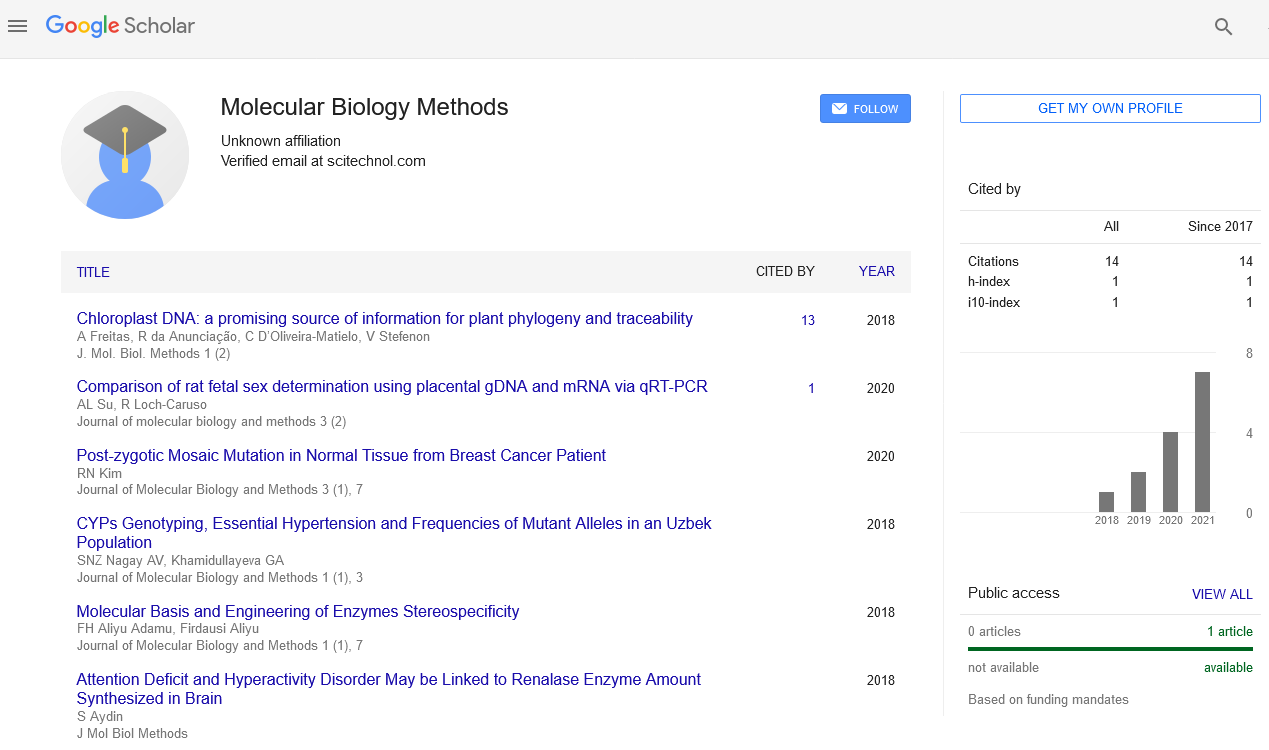Commentary, J Mol Biol Methods Vol: 6 Issue: 3
Exploring the Impact of Neurobiology on Medicine and Modern Science
Kaleen Caeser*
1Department of Anatomy and Neurobiology, Virginia Commonwealth University, Richmond, United States of America
*Corresponding Author: Kaleen Caeser,
Department of Anatomy and
Neurobiology, Virginia Commonwealth University, Richmond, United States of
America
E-mail: kaleen_ceaser@vcu21.edu
Received date: 23 August, 2023, Manuscript No. JMBM-23-118069;
Editor assigned date: 25 August, 2023, PreQC No. JMBM-23-118069 (PQ);
Reviewed date: 08 September, 2023, QC No. JMBM-23-118069;
Revised date: 15 September, 2023, Manuscript No. JMBM-23-118069 (R);
Published date: 22 September, 2023, DOI: 10.4172/jmbm.1000143
Citation: Caeser K (2023) Exploring the Impact of Neurobiology on Medicine and Modern Science. J Mol Biol Methods 6:3.
Description
In the ever-evolving landscape of modern science and medicine, the field of neurobiology stands as a source for understanding the intricate workings of the human brain. With each passing year, neurobiology contributes to new findings that redefine the approach to healthcare, mental health, and various aspects of human life. The human brain is an astonishing organ, consisting of around 86 billion neurons, each with numerous connections. Neurobiology delves into the structure, function, and development of this complex system. This understanding is important for diagnosing and treating neurological disorders, mental health conditions, and a range of other medical issues.
Neurobiology's impact on medicine is most evident in clinical practice. One of its remarkable contributions is in the field of neuroimaging. Techniques like Magnetic Resonance Imaging (MRI) and Positron Emission Tomography (PET) have revolutionised the ability to visualise the brain's structures and functions. These technologies enable doctors to diagnose conditions such as brain tumours, strokes, and neurodegenerative diseases with unparalleled precision.
In addition to diagnostics, neurobiology has brought about innovative treatments. Deep brain stimulation, for instance, is a procedure used to alleviate symptoms of Parkinson's disease, depression, and other neurological conditions. By precisely targeting specific brain regions with electrical impulses, this approach has transformed the lives of many patients.
The intersection of neurobiology and mental health is an essential area of analysis. Disorders like depression, anxiety, and schizophrenia, once stigmatised and poorly understood, are now being viewed through the lens of neurobiology. Experts are uncovering the neural circuits, neurotransmitters, and genetic factors that underlie these conditions. This knowledge is guiding the development of new pharmaceuticals and therapies that provide real hope to individuals living with mental health disorders.
Furthermore, neurobiology has also shed light on the impact of lifestyle factors on mental well-being. Studies show how exercise, diet, and sleep can influence brain function and mental health. This information empowers individuals to take proactive steps towards maintaining their mental well-being.
In the realm of cognitive enhancement, neurobiology plays a significant role. Analysts are investigating the brain mechanisms underlying learning and memory, which has led to the development of nootropics and cognitive training programs. These innovations have implications not only for healthy individuals looking to boost their cognitive abilities but also for those with cognitive decline or neurological conditions.
As one can advance into the future, one of the most exciting prospects is the development of Brain-Computer Interfaces (BCIs). Neurobiology is at the forefront of this transformative technology. BCIs allow direct communication between the brain and external devices, opening up possibilities for individuals with paralysis, spinal cord injuries, or other mobility challenges.
BCIs hold potential for those who have lost the ability to speak, as they can be used to translate neural signals into words or commands. This technology may also provide new ways to control prosthetic limbs, providing greater autonomy and quality of life to amputees. While the applications of neurobiology in medicine are striking, this field also significantly impacts basic studies. The discoveries made in laboratories often have broader implications for the understanding of the brain and its functions.
Conclusion
The impact of neurobiology on medicine and modern science is undeniable. It has revolutionised the understanding of the human brain and, by extension, the approach to healthcare, mental health, and cognitive enhancement. The field continues to find hope for patients with neurological conditions and provides exciting possibilities for the future, from brain-computer interfaces to enhanced learning methods. As one can move forward, it is essential to approach the challenges and ethical considerations with the same level of determination and innovation that has characterised the field of neurobiology itself.
 Spanish
Spanish  Chinese
Chinese  Russian
Russian  German
German  French
French  Japanese
Japanese  Portuguese
Portuguese  Hindi
Hindi 